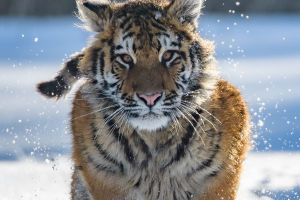Penguins are fascinating and adorable creatures that belong to the bird family Penguinidae.
There are 18 different species of penguins worldwide, and most of them can be found in the Southern Hemisphere.
These birds are known to feed on marine zooplankton, particularly Antarctic krill, as well as some brachiopods, squid, and small fish.
On average, each penguin consumes about 0.75 kg of food per day, with Antarctic krill making up a significant portion of their diet.
Penguins are known for their simple, generous, and entertaining temperament.
While penguins may be entertaining to watch, it is important to recognize that their habitat is fragile and needs protection. Here are some ways that we can help protect penguins:
Reduce the use of resources that contribute to environmental damage: Global warming is having a significant impact on the penguin's habitat, and it is important to reduce the use of resources that contribute to environmental damage. This could include reducing the use of fossil fuels and other heat resources that contribute to global warming.
Establish protected areas: The establishment of protected areas helps protect penguin habitats and prevents human activities from damaging their environment. This approach has been successful in many areas and is an important tool for conservationists.
Adopt a penguin: By adopting a real live penguin, more people can learn about these amazing creatures and become more aware of penguin conservation. This is an excellent way to support conservation efforts while also learning more about penguins and their habitat.
Support conservation organizations: Supporting conservation organizations that focus on penguin conservation can help raise awareness about penguins and provide a better environment for them to live in.
Many conservation organizations offer opportunities for individuals to volunteer, donate, or participate in fundraising events.
Aside from their importance to conservation efforts, penguins are also beloved for their unique and entertaining personalities. Many people have their own penguin stories, including the story of a little penguin in the Antarctic.
The story follows a young penguin who decides he is old enough to play alone, only to become lost and eventually rescued by a little boy.
The penguin's parents are grateful to the boy and give him some beautiful shells as a reward for his help.
Penguins are not only important for conservation efforts, but they also play a significant role in the ecosystem.
As predators of krill and other small sea creatures, they help regulate the population of these organisms, which in turn impacts the food web.
Furthermore, penguins are also an indicator species, meaning their health and population trends can provide insight into the overall health of the ecosystem.
Unfortunately, many penguin species are currently threatened by habitat loss, climate change, overfishing, and other human activities.
Conservation efforts are critical to ensuring the survival of these incredible animals, and individuals can make a difference by making small changes in their daily lives, such as reducing energy consumption and choosing sustainable seafood options.
Additionally, education is key to penguin conservation. By learning more about these amazing creatures and the threats they face, individuals can become advocates for penguin conservation and inspire others to take action.
Conservation organizations and zoos also play an important role in educating the public and raising awareness about the importance of protecting penguins and their habitats.
Overall, penguins are a unique and beloved part of the natural world, and it is up to all of us to ensure their continued survival.
By taking action and supporting conservation efforts, we can help protect these amazing birds for generations to come.
In conclusion, penguins are amazing creatures that deserve our respect and protection.
By taking steps to reduce environmental damage, establish protected areas, adopt penguins, and support conservation organizations, we can help ensure that these fascinating birds continue to thrive for generations to come.


